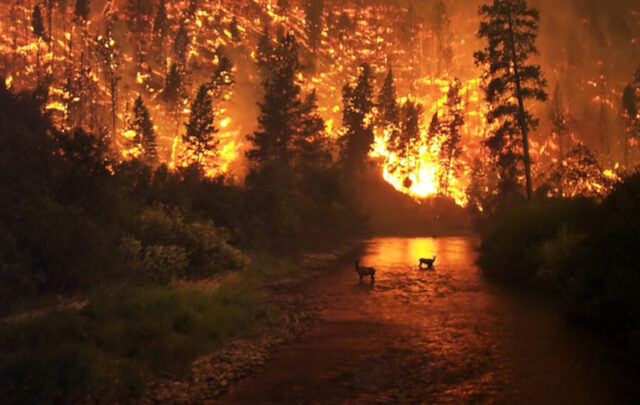Civilization as we know it will come to an end sometime this century when the fuel runs out.
Such is the grim prediction author and California Institute of Technology professor and vice provost David Goodstein concluded his lecture with Monday night.
“I certainly hope my prediction is wrong,” he told the audience that filled Woodward Hall. “And I certainly hope making the prediction will help make it wrong.”
Goodstein was on a book tour for his latest book, Out of Gas: The End of the Age of Oil.
He gave a 30-minute presentation on the projected exhaustion of world fuel supplies and the difficulties of making the transition to alternative fuel sources.
Based on the Hubbert Peak theory, America is scheduled to run out of oil by the end of the century, Goodstein said.
Hubbert’s theory, created by geophysicist M. King Hubbert during the 1950s, accurately predicted the availability of oil in the United States would peak in the early 1970s.
Goodstein said the theory has predicted the rate of global oil discovery, suggesting it may predict total global oil supplies.
He said the world is headed toward a global oil shortage that could cause warfare, economic depression and the crumbling of institutions.
“There will be a crisis,” he said. “It will be painful. We have just invaded Iraq. If anybody thinks that war was not about oil, you should think again. I call that ‘oil war two.’ The first Gulf War was ‘oil war one.'”
Chris McKenna, an architecture student, said he is discouraged young people show such low interest in energy issues, even when faced with grim outcomes like the end of civilization as it presently exists.
“They don’t react,” he said. “They’re just like, ‘OK, whatever, I’m just going to go watch TV.'”
Goodstein’s longtime colleague and friend, UNM Professor Robert Duncan, arranged his visit. He asked Goodstein to speak at UNM as part of his larger effort to use physics education to create awareness of the world’s energy problems.
“David is one of the leaders in physics education worldwide today,” Duncan said. “Energy policy is one of the most burning concerns of our time, but it’s something that virtually no politician ever addresses, because it doesn’t resonate with the public. Hence, a gruesomely important problem such as this gets overlooked in election cycles.”
Goodstein said the world needs a Manhattan Project to develop fusion power, a theoretical fuel system that would produce an inexhaustible supply of energy at negligible cost and with little environmental impact.
“Unfortunately, nuclear fusion has been 25 years away for the past 50 years, and it is still 25 years away,” he said, prompting laughter. “It has been said that nuclear fusion is the fuel source of the future, and it always will be.”
Our second-best hope, he said, is solar power. But to make the transition to solar energy an area half the size of California covered in solar panels would be needed, he said.
“That’s not a huge land area,” he said. “There’s lots of unused land in the world.”
Asked why the U.S. government is not addressing fuel issues with more urgency, Goodstein said people tend not to react until they are hurt.
“If you drop a frog into a pan of hot water, it’ll jump out,” he said. “If you gradually heat the water up, the frog will just sit there. We’re in a gradually heating pan.”





